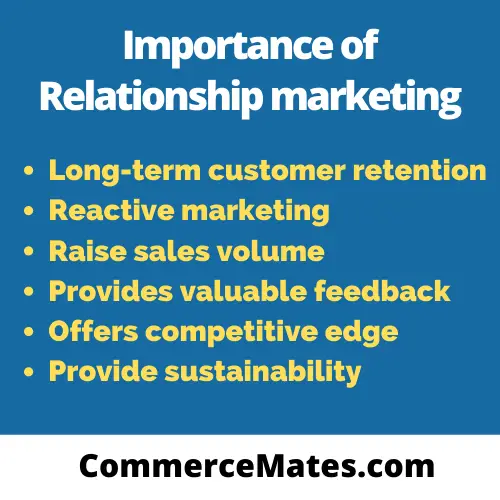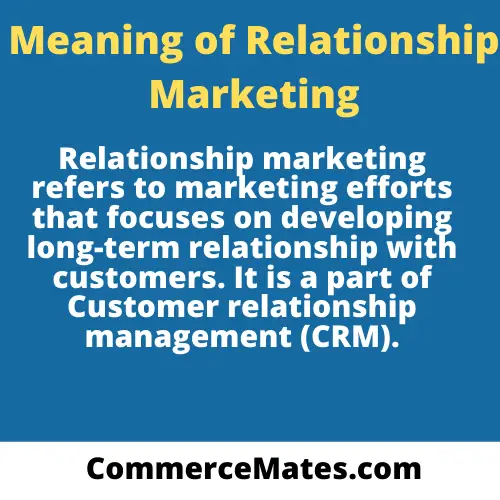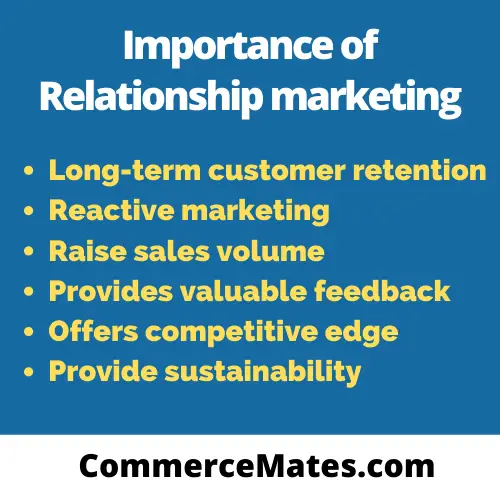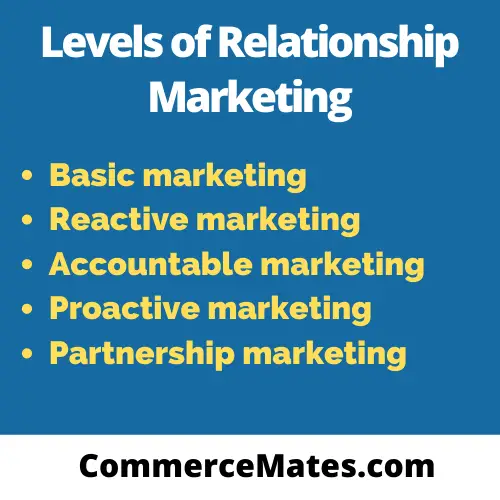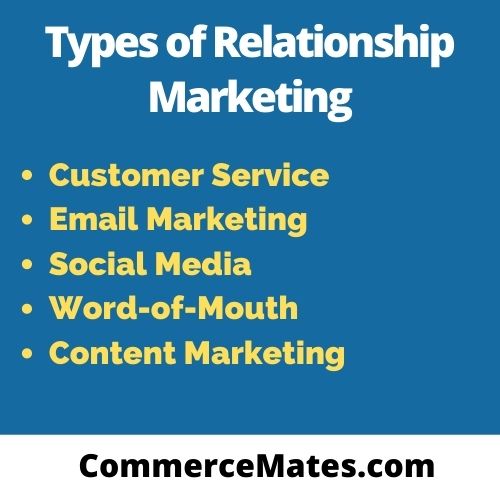Contents
Meaning of Relationship Marketing
Relationship marketing refers to marketing efforts that focuses on developing long-term relationship with customers. It is a part of Customer relationship management (CRM) which aims to achieve long-term engagement of clients with business for maintaining its profitability. Relationship marketing is distinct from other types of traditional marketing.
It carries out activities for achievement of long-term goals like customer loyalty. Whereas, traditional marketing works towards getting short-term goals like customer acquisition and one-time sales. Traditional marketing does not pay any attention on building relationships. Relationship marketing instead of sales transactions emphasizes on customer retention and their satisfaction level.
Companies find it cost-effective in marketing their products to existing customers as they don’t need to run mass promotional campaigns. Nowadays, brands run customized marketing campaigns for communicating with target audience that enables them in understanding customer wants efficiently. Long term customers are also less likely to churn which develop close relationships with brand thereby generating more profits for them.
Types of Relationship Marketing
Relationship marketing work effectively through the combined efforts of its components. These are customer service, email marketing, content marketing, word of mouth and social media. All of these are discussed in detail as given below: –
- Customer service: It is a crucial element of both marketing and sales. Relationship marketing pays attention on functioning of service departments of organizations. These service departments operate to solve customer problems and serving them in a better way. Attempts are made by relationship marketing to enhance the internal operations of business in order to provide better customer service. Customers are unlikely to return to a brand if they are not served properly.
- Email marketing: Email marketing is an efficient tool of reaching out to target audience by business. A promotional message containing details about products or services to be promoted is forwarded to the maid ids of customers. Companies need to ensure that right information is shared at right time and with right individuals. Peoples will be interested towards a particular brand as long as they receive relevant promotions of their interest.
- Social media: Social media is a marketing platform which is widely used in relationship marketing. It is one that uses social media platforms like Facebook, Instagram, Google and Twitter for sharing valuable content with customers. A direct communication with people is made for gaining insight into their lifestyles.
- Word-of-mouth: Word-of-mouth marketing is type of promotion initiated from consumer end among his/her acquaintances regarding brand products. It is a free type of advertising triggered by experience of customers developed over their long-termed relationship with brand. This type of marketing is one of the most powerful tool as it leads to encourage more people to buy brand products as consumers easily trust their friends.
- Content marketing: Content means all information regarding features of product, advertisement and offers that is intended to attract target customers. Content marketing refer to sharing of all this information for free before making sales that leads to develop desired customer relationship. This information is of great interest to customers which assist them in their journey with brand while making purchase decisions.
- Customer awareness and education: It involves educating the customers by providing them information about products and services. Efforts are made to strengthen relation with customers by making them aware about market information. It is one of the effective ways of developing better understanding by giving them valuable information instead of just attempting to sell their products.
Levels of Relationship Marketing
Relationship marketing has five levels where each level represents a distinct stage of it. These levels are basic marketing, reactive marketing, accountable marketing, proactive marketing and partnership marketing. Basic marketing is the starting stage whereas most advanced stage is partnership marketing.
- Basic marketing: Basic marketing is the initial phase of relationship marketing which is concerned with acquiring clients and providing them guidance throughout the sale journey.
- Reactive marketing: It is the second step where company receive response i.e. feedback form customers post making sales.
- Accountable marketing: This step is expanded version of reactive marketing. Here, company tries to contact with customers in order to take their suggestions which guides business in improving their experience level.
- Proactive marketing: Proactive marketing is a stage where business make efforts to enhance the quality of their products and services. Companies after taking suggestions form customers work on them in order to provide them the best possible experience.
- Partnership marketing: This stage also makes efforts to improve customer experience similar to proactive marketing. Business tries to collaborate with another business in order to improve their services.
Importance of Relationship Marketing
- Long-term customer retention: Relationship marketing enables business in long-term retention of customers by serving them in efficient way. It aims at providing better satisfaction to clients rather than just focusing on customer acquisition. When customers are provided with exactly what they want, their overall experience with brand gets improved and are more likely to stay for a longer time period. Customer relationship marketing facilitates business in achieving all this.
- Reduces marketing and advertising expenses: Relationship marketing enable companies in lowering their cost of acquiring customers. It requires huge expenses to run wide advertisement campaigns for acquiring new customers. This type of marketing is able to retain customers for a long term by offering them quality services. Businesses are not required to make extra efforts for acquiring more customers which bring down their advertisement cost.
- Raise sales volume: It enables companies in raising the overall sales volumes by improving customer experience. Companies find it quite easier to up-sell and cross-sell their products to satisfied of customers. Loyal customers have faith in brand products and they doubt their qualities. They even suggest the products of brand to their friends and relatives which ultimately leads to increase the sales volume.
- Provides valuable feedback: Relationship marketing plays an efficient role in providing valuable feedback to business organizations. Feedback or suggestion form customers side enable brands in improving their quality level. Customers who share strong relationships and are happy with their brands take efforts to give their precious feedback about firm products and services. They even communicate to them essential market information which help in designing right products as per the people’s demand.
- Offers competitive edge: Relationship marketing is the most powerful tool which enables firms in gaining competitive edge over others market participants. It ensures that whole information is honestly communicated to clients with the motive of developing strong relationships with them. Efforts are made to provide better quality services which enhance the overall customer experience. This way brands are easily able to develop a distinct image in market.
- Provide sustainability: It provides sustainability to overall business growth by facilitating consistent sales. Relationship management enables in regulating the profitability of organization by holding customers for a longer period of time. It focuses on offering more personal touch to customers which leads to develop better understandability with them. Customer make regular purchases with their brand and do not make frequent shifts to other brands.
Examples of Relationship Marketing
- Offering exceptional high quality service to consistent customers that will leads to build their loyalty toward a brand.
- Launching a referral/loyalty program where a customer is rewarded with some points for his/her continued patronage.
- Providing discounts or bonuses to repeat customers.
- Organizing events in order to connect with customers and building a community.
- Rewarding such customers that on behalf of brand provides word-of-mouth advertising by creating brand advocacy programs.
- Thanking customers via giving them surprise gift or a social media post.
